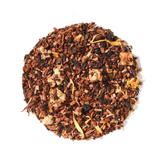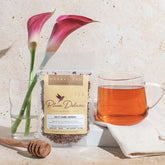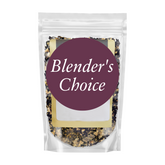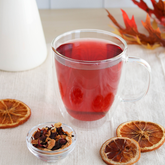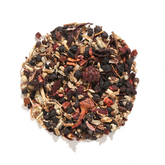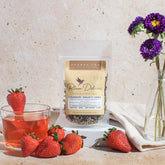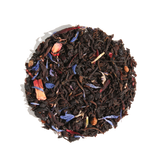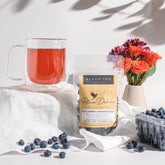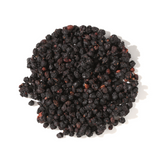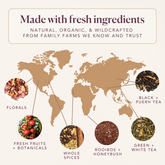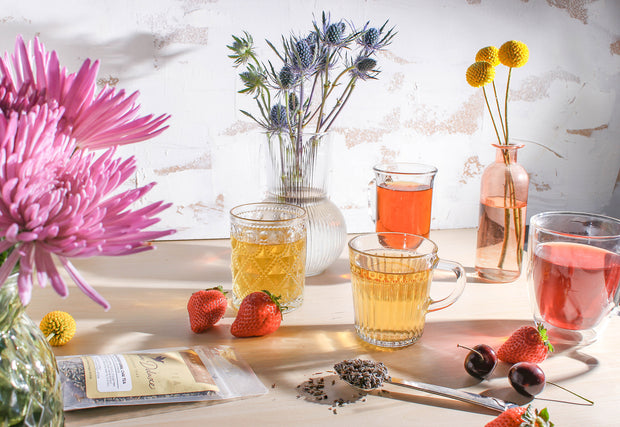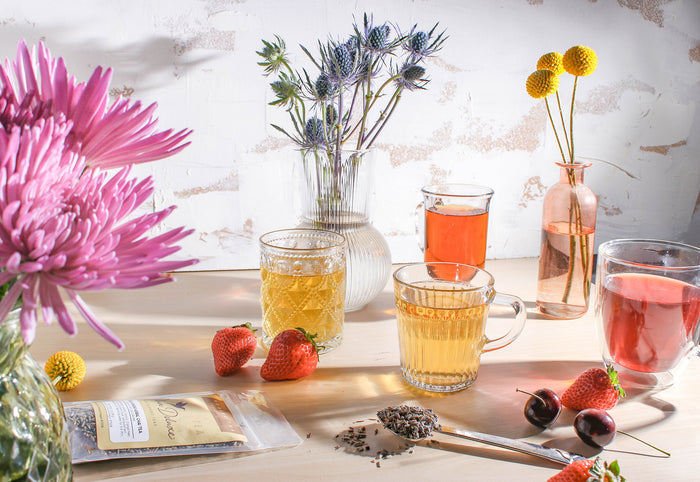On the dreariest of winter days, during the most inopportune times, while hibernating indoors and surrounded by kids, coworkers, and family -- a cold rears its ugly head. The dreaded stuffy nose, sore throat, body aches, and sneezing crud! So, I find myself asking the infamous question, “What tea is good for a cold?"
Truthfully, I’d just like to know what the “cure-all” is. Unfortunately, there is no such magical cure, but I have the next best thing. This article is jam-packed with delicious vitamin- and antioxidant-infused tea recommendations with a splash of some herbal medicinal wisdom to help get you back on your feet in a jiffy.
*This content is not intended to be a substitute for professional medical advice, diagnosis, or treatment. All information and resources found within this article are based on the opinions of the author. Always seek the advice of your physician or other qualified health providers with any questions you may have regarding a medical condition.
Ginger: The Spicy Reliever
I’m starting off strong with the well-known root, ginger. Ginger root was first discovered some 5,000 years ago and is praised for its wondrous healing properties. It is a strong spice, with a recognizable aroma and taste. It's also versatile, showcasing its flavor in baked goods, cooked dishes, and, of course, tea.
Ginger root contains anti-inflammatory compounds that help to relieve a sore throat as well as aid with an upset stomach. You may drink it in tea form, or gargle for those pesky scratchy throats.
Enter: Rejuvenation Blend Herbal Tea, which contains both ginger and lemon. A real body booster, this tea includes rose petals and apples for a calming balance. If this doesn’t sound like your cuppa, there is always our Coconut Ginger Soother Herbal Tea, which is a delight of apple, cinnamon, coconut, and ginger.

Elderflower and Elderberry: The Traditionalists
Elderberry is a traditional and well-studied remedy for what ails you. Elderberry tea is made from the berries of the elder bush, and it is these berries that are known to help relieve the symptoms of a cold. It is even safe for children -- a bonus in my book! Elderberry tea is higher in antioxidants than cranberries or blueberries.
Elderflower should not be confused with elderberry; I had this initial misconception myself. Although derived from the same plant, elderflower is a beautiful white flower with a delicate and captivating floral flavor. It also contains antioxidant properties but does not compare to that of the elderberry. It's great for simple syrups, baking, and making enchanting teas.
Our Just Elderberry Herbal Tea is a great powerhouse antioxidant tea, and is also perfect for making elderberry syrup.
A wonderful elderflower tea, especially for that calming cup of deliciousness, is our Evening in the Garden Herbal Tea made with elderflower, lemon, and rose. This tea is very refreshing when you’re feeling under the weather; the aroma is intoxicating.
Last but not least, I cannot forget my favorite of the elderberry teas, The Self Care Blend, a perfect blend of tart elderberry and sweet apricot. Apricots are also filled with so many “goodies,” such as potassium, magnesium, Vitamins A and C, as well as a multitude of other antioxidants. This is a cupboard must-have!

Peppermint and Chamomile: The Soothers
Like a burst of cool air that tingles your senses, peppermint aims to refresh and soothe. Peppermint leaves contain menthol, which can have a slight anesthetic effect and works great on a sort throat, as well as suppressing a cough. Peppermint has significant antimicrobial and antiviral activities within the leaves -- a great way to help fight the multiplicity of these germs.
Chamomile also falls under our “soothers” category as it is praised for its effectiveness in calming the mind and body. We all know when you’re run down, the most important medicine is a good night of sleep. Chamomile taken at bedtime can be effective in treating insomnia and help you catch up on those much-needed ZZZs.
Still wondering what tea is good for a cold? I present to you our dynamic tea duo: Cuddletime Herbal Tea, which contains both chamomile and mint. As the day comes to an end, it is the perfect time to brew of cup of this bedtime tea. Sweet dreams!
Rosehip: The Body Booster
Rosehip fruit is bright red and bursting with Vitamin C. In fact, it contains 60 times the Vitamin C found in an orange! Most of us know Vitamin C is a vital nutrient, but why, exactly?
Vitamin C helps to maintain the health of blood vessels, improving circulation, and works great for respiratory ailments. All the wondrous compounds found in rosehip fruit help to curb oxidative stress, which is an imbalance between free radicals and antioxidants in your body. Thankfully, rosehip has anti-inflammatory action that counteracts these free radicals and helps to return the body to a more peaceful state.
I love our Cozy Tranquil Dream Herbal Tea, which contains rosehip and spearmint as well as a tantalizing blend of lemongrass, chamomile, orange, and hibiscus.

Hibiscus: The Ruby Revitalizer
Hibiscus is a beautiful flowering plant that is used for various medicinal purposes; the deep ruby-pink hues are what most tea lovers identify with hibiscus. Hibiscus is rich in antioxidants, and drinking three cups a day will provide you with your daily allotted dose of Vitamin C.
Egyptians used hibiscus to aid with fever, while in Africa it was used to help with the multitude of cold symptoms. Hibiscus remains a popular herbal remedy and is used for a variety of illnesses, including as a paste for wound care, lowering cholesterol, aiding in liver disease, and helping to relieve constipation.
Our Happy Hour Herbal Tea is a strong, wonderfully tart infusion that is delightful hot or cold. Even when I’m not sick, I love brewing up a pot of this tea, letting it cool, and creating my own summer iced cocktail by adding a little sugar and fresh lime slices. Refreshingly satisfying!

The Complementary Add-ins
When a regular cup of tea isn’t quite enough, there are some wonderful add-ins that also aim to soothe and aid in the body’s recovery.
Honey is wonderful on its own to soothe a sore throat or to stir into your cup of tea for some added sweetness. The benefits of honey come from its antimicrobial, antibacterial, and antioxidant properties. It boosts the immune system, which can aid in reducing the severity of your cold and may help prevent future colds if consumed regularly.
Cinnamon is another wonderful spice that I like to keep handy. Cinnamon has been used for hundreds of years and is renowned for its flavor and benefits. Like honey, it contains anti-inflammatory, antibacterial, antioxidant, and immune-boosting properties. It has been used to help fight harmful infections and viruses.
Add these two mighty ingredients together in a cup of ginger tea and you have quite the powerhouse concoction. To help relieve common cold symptoms, I mix two tablespoons of honey with one teaspoon of cinnamon and dissolve in the tea. The best part? You can never have too many cups!
We also have a phenomenal hot cinnamon spice tea called The Spice of Life. This black tea with cinnamon and cloves provides the perfect cup of warm comfort on a cold winter day. I find it to be very effective as well to aid in soothing an upset stomach, and cloves are known to help aid in digestion.
With the wealth of knowledge gained here, I believe we have answered the infamous “what tea is good for a cold” question. Now, it’s time for you to put on those comfy clothes, brew yourself up a pot of one of these lovely teas, grab a good book, and rest. Doctor's orders!
*This content is not intended to be a substitute for professional medical advice, diagnosis, or treatment. All information and resources found within this article are based on the opinions of the author. Always seek the advice of your physician or other qualified health providers with any questions you may have regarding a medical condition.
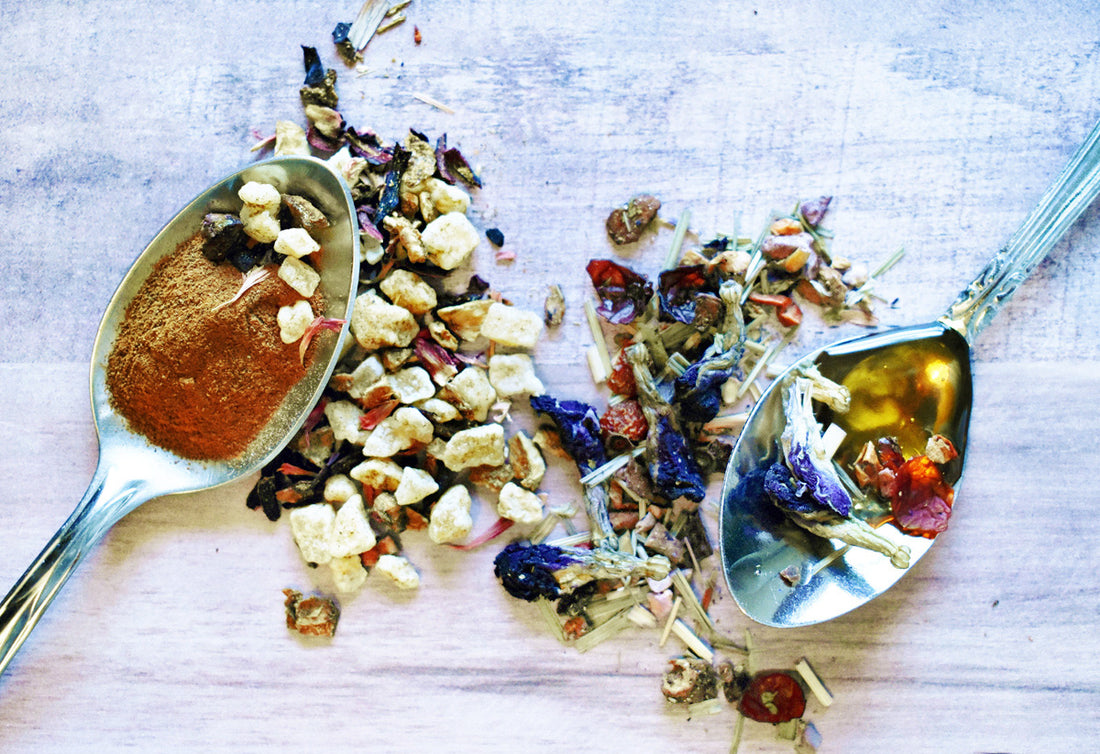
![Spring Break Tea Variety Pack [6-Pack Variety of Flavors]](http://www.plumdeluxe.com/cdn/shop/files/spring-break-pack.jpg?v=1740682266&width=165)

